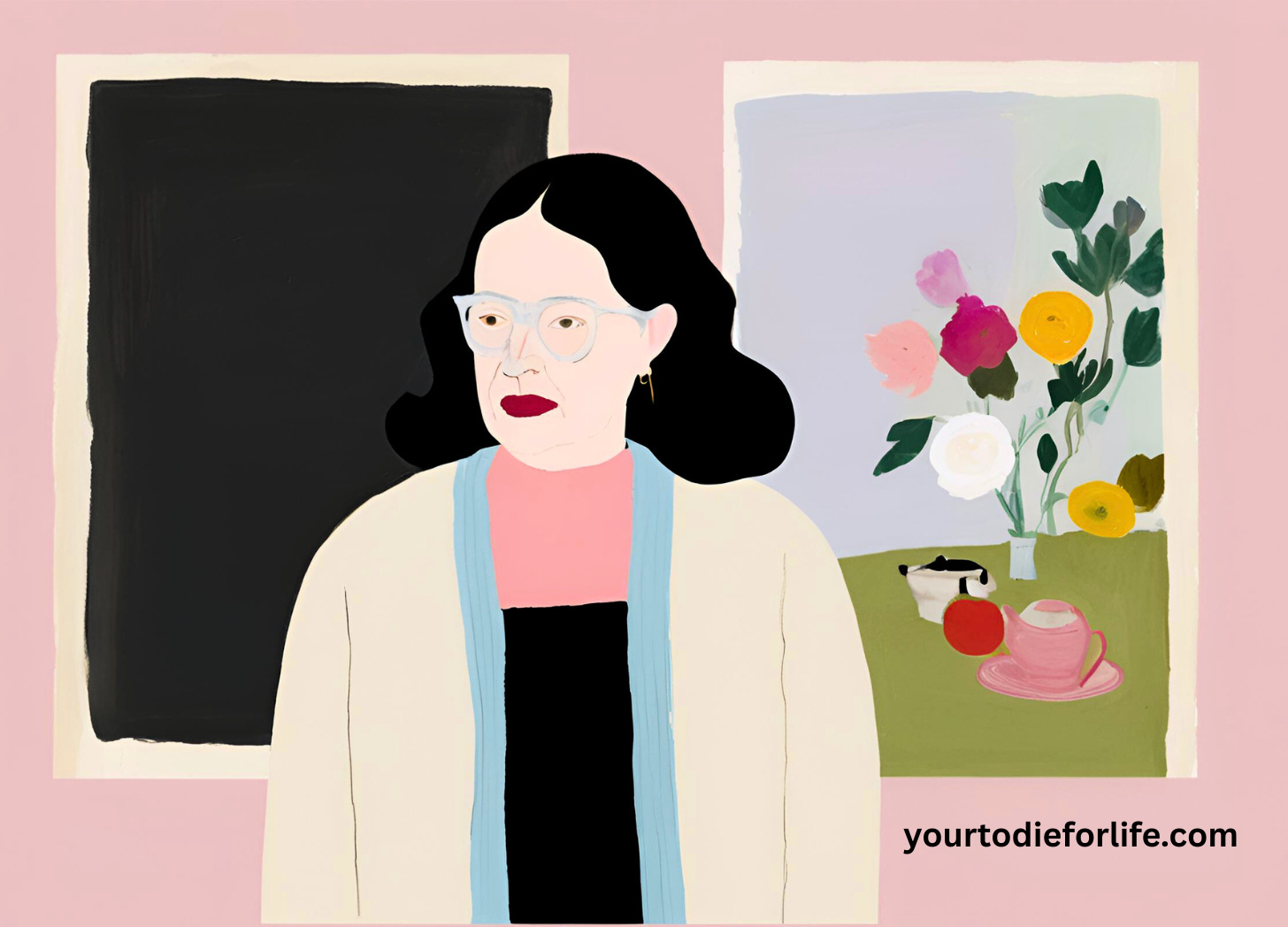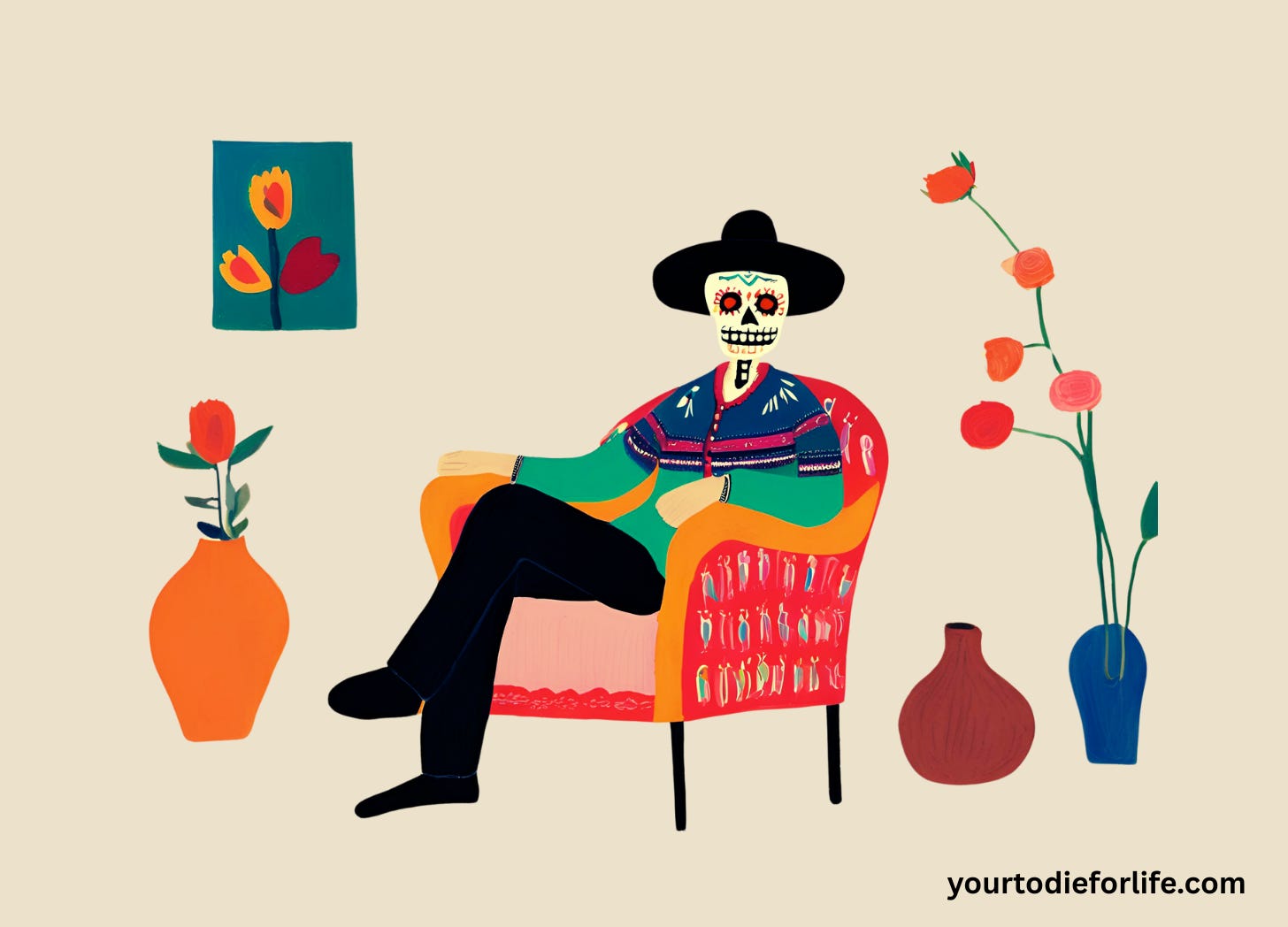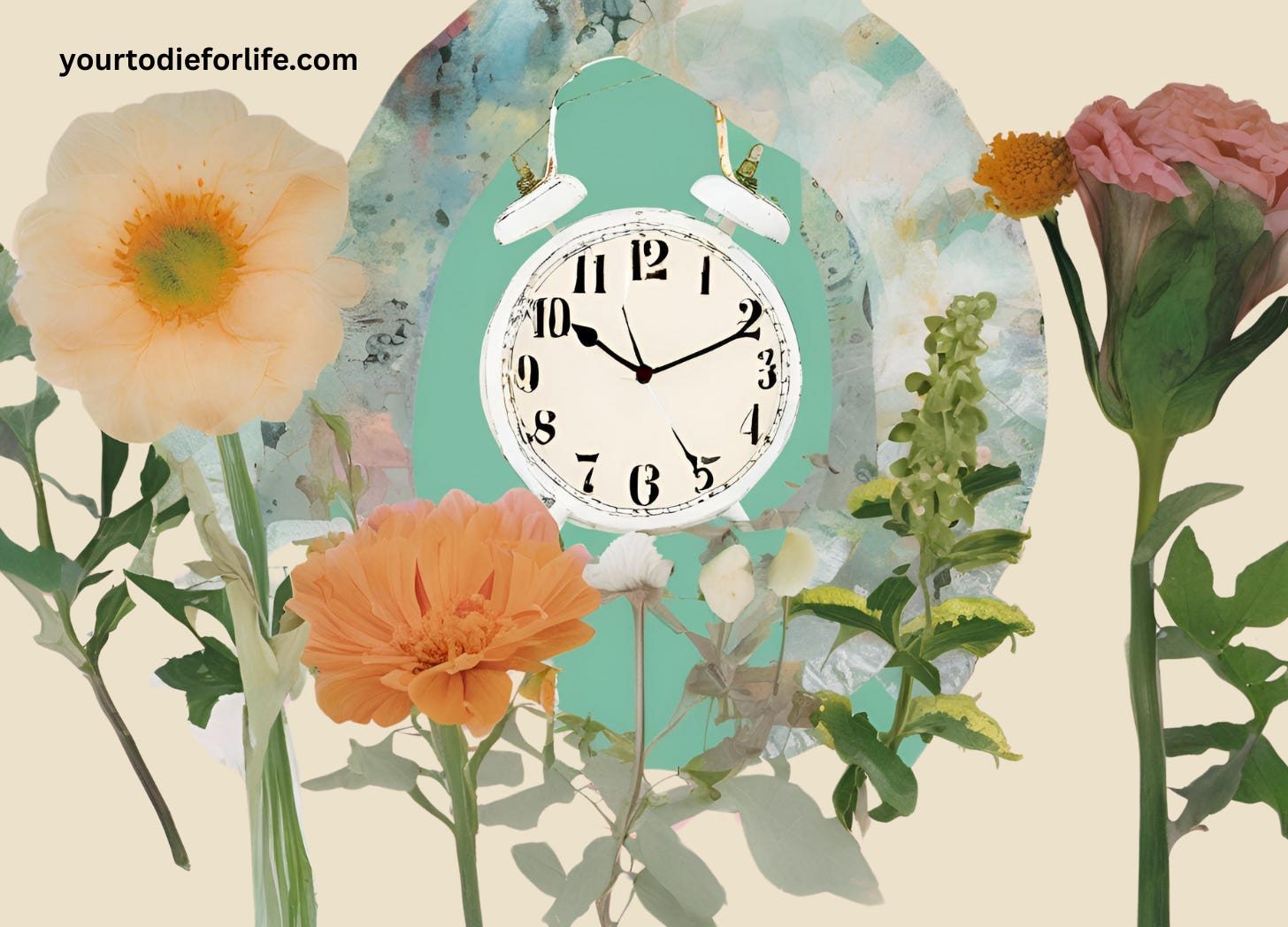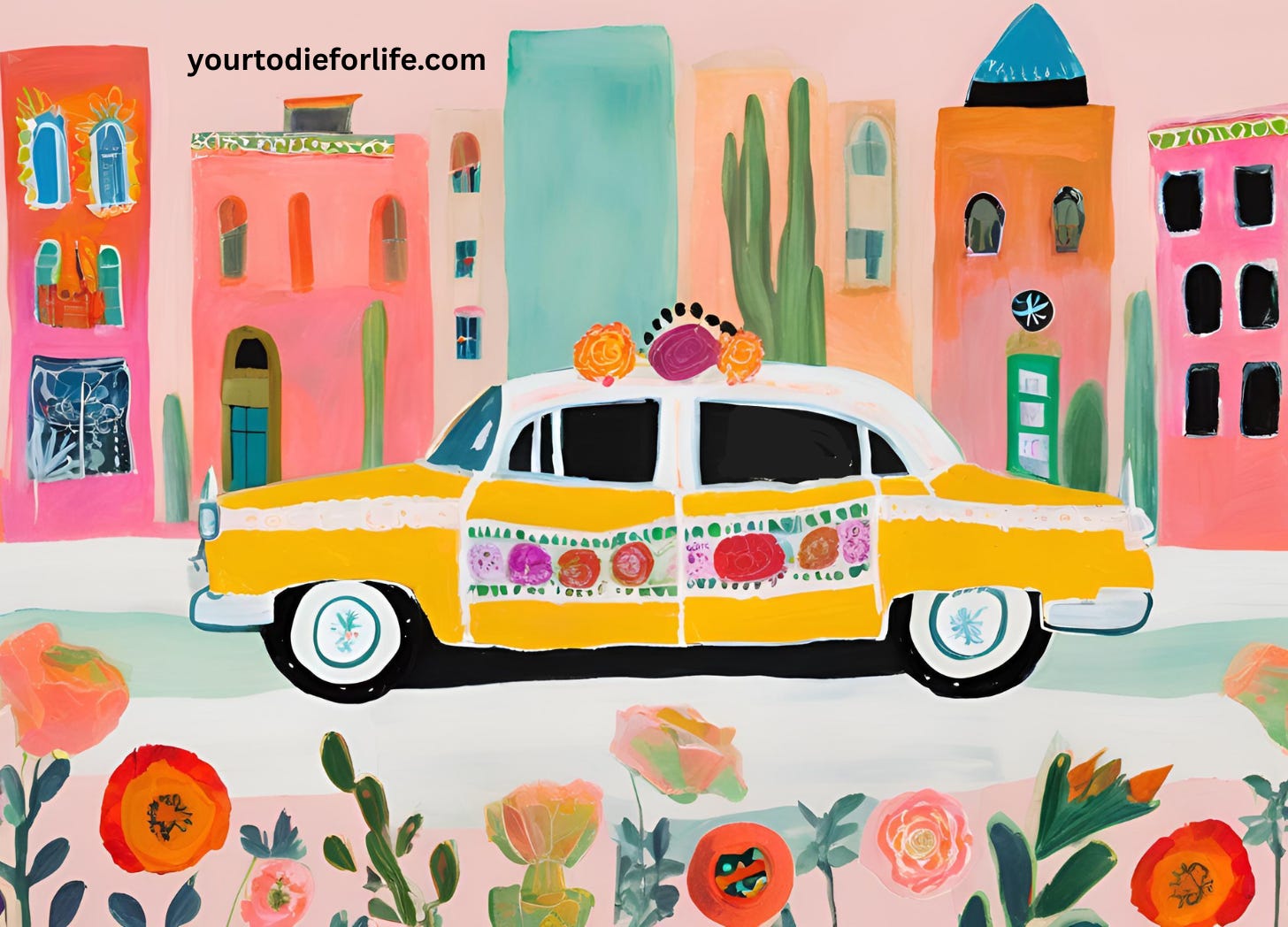My Interview with Death. About Mortality.
Recently, I arranged an interview with Death, to fact-check some things with him. Here's what he told me about the purpose of mortality.
Before we begin, a quick note.
I wrote a book called Your To-Die-For Life… which is a #1 new release!
The book is about death, yes. But it’s really about life. And how to live yours more boldly and meaningfully. How to stop outsourcing your joy to “someday.”
Early readers have said:
“Fascinating! Who knew trauma and death could be so inspirational?” -Jenny Lawson, NY Times Bestselling Author
“This is not only the funniest book about death I’ve ever read, it’s also an inspiring, useful guide for living with greater joy and purpose… and less fear and regret.” -AJ Jacobs, NY Times Bestselling Author
You can order my book here… if you're someone who likes laughing while quietly rethinking your entire life.
Now… the essay.
Recently, I arranged an interview with Death, to talk with him about his job performing mortality.
I wanted to fact-check some things with him, about death and grief and dying.
Death arrived sooner than expected (classic death behavior).
He showed up during my lunch break, while I was watching a baking show and eating Thai food directly from the container.
"You're early," I told him, "I thought we said 4pm?"
"I'm always exactly on time," Death replied with a wink, then pushed his way into my apartment.
I studied Death closely.
He was wearing a sensible cardigan.
I'd always imagined Death would arrive more dramatically… in a hooded cloak, skeletal hands, perhaps a scythe.
But Death looked surprisingly like my third-grade social studies teacher, Mr. Massa, who once sent me to the principal's office for drawing mustaches on every president in my history book.
Death eyed my Pad Thai noodles with interest. "That looks good."
"It is. Want some?" I replied.
“Very much,” he answered.
“Let me get you a plate,” I offered “Make yourself at home. But not too much at home…. If you know what I mean.”
Here's the thing about trying to talk with Death.
It's awkward. Intensely, paralyzingly awkward. Like running into your gynecologist at your nephew's birthday party, or accidentally sexting your mother.
Death took a seat on my couch. He looked at the TV which was still playing a baking show. "Is this the episode where they make soufflés? I love that one.”
Death watched as the bakers all frantically tried to save their collapsing desserts. "They're so worried about such temporary things," Death mused. "The soufflés, their scores, what the judges think. None of them realize that in a hundred years, no one will remember any of this."
"That's depressing," I said, scooping some pad Thai noodles onto a plate for him.
"Actually, I find it liberating," Death replied. "Nothing lasts. That's what makes it precious. It’s just that people love to pretend they don't know they're dying. It's the worst best kept secret in the universe.”
“Oh, let me write that down,” I said - reaching for my laptop to take notes.
"You know, you're the first human who's summoned me for an editorial consultation," Death said. "Usually it's bargaining, denial, or that thing where people try to challenge me to chess matches, which - between us - is vastly overrated as a game.”
“I’m writing a book about death," I explained, trying to sound professional. "And it seemed only fair to hear your side of things.”
“Yes, I know, people think I'm cruel,” Death said delicately twirling noodles around his fork with surprising dexterity. “But I'm actually the most democratic force in the universe. Presidents, plumbers, pop stars… everyone gets the same treatment in the end."
"That's not comforting," I said.
"It wasn't meant to be," Death replied.
Death was quiet for a long moment.
”But I wish people knew that I'm not the enemy," he told me. ”Disease is cruel. Violence is cruel. Accidents are random and senseless. But I've been cast as the villain in humanity's story, when I'm actually more like... the Uber driver taking you to the next destination.”
"Will it hurt?" I asked Death.
"What? Dying?" Death seemed surprised by the question. "Does birth hurt?"
"I mean, yes. Famously."
"Well, there you go then," Death said. "Doorways usually pinch a bit."
"What about regrets?" I asked. "In your experience, what do people regret most when they see you coming?"
Death smiled sadly. "They regret time. Not jut how they spent it, but how they thought about it. They treated time like it was infinite. They put things off. They saved their good china for special occasions that never came. They waited to tell people how they felt. They deferred joy."
"Why do you think people are so afraid of you? Of mortality awareness in general?" I asked Death.
Death considered this, fingers drumming lightly on the armrest. "Because it reminds them they're not in control. Humans love the illusion of control. Acknowledging me means acknowledging uncertainty. Most people find that... uncomfortable."
"What's the most common reaction when people see you coming?" I asked, trying to maintain a journalistic tone.
"Depends on the person. The age. The circumstances." Death reached for more pad Thai. "Surprise is common. Not because they didn't know death exists. But because humans are spectacular at denial. Even the ones with terminal diagnoses, or who are actively skydiving without first checking their parachute …they all seem shocked when I appear."
"But also..." Death continued, "there's often a flash of recognition. Like they've always known me. Like we've been playing hide-and-seek their whole lives and I've finally said 'found you.'"
"What do you think about humans' attempts to extend life and cheat death?" I asked.
Death actually laughed. "I find it charming. Like watching a child try to stay up past bedtime. All that bargaining and resistance, only to eventually collapse into sleep anyway."
"But—" Death held up a finger, "I don't begrudge you the effort.”
"So you're not worried about being unemployed anytime soon?” I asked with a chuckle.
"Not in the slightest." Death's eyes twinkled.
“And what do you think of our death-denying culture? The way we hide death away in hospitals and funeral homes, pretend it's not happening?" I asked.
"I find it... curious. And relatively new,” Death replied, while adjusting his cardigan. "For most of human history, death was an everyday presence. People died at home, surrounded by family. Bodies were washed and prepared by loved ones. Death was woven into the fabric of community life."
"And now?"
"Now you've medicalized it, institutionalized it, put it behind closed doors." Death looked slightly sad. "You've lost something in the process. A certain wisdom. A perspective that comes from living with the knowledge of mortality."
"Do people's regrets change throughout history, or are they always the same?" I asked.
"The packaging changes, but the contents remain remarkably consistent," Death said. "Romans regretted not spending more time with their children just like modern CEOs do. Medieval peasants wished they'd told someone they loved them, just like people do now.”
“Do you always show up in a cardigan?” I asked.
“I appear in a form each person can accept, one that allows the transition to happen with minimum resistance. For children, often a grandparent or beloved character. For adults, sometimes a forgotten teacher or a stranger who was kind to you once."
"And you chose Mr. Massa for me because...?"
"He was the first person who taught you that history has patterns. That everything that rises also falls. That endings are built into beginnings." Death smiled. "Also, you respected him despite the mustache drawing incident."
"If you could give humans one piece of advice about living, knowing what you know about death, what would it be?" I asked.
Death didn't hesitate. "Pay attention."
"That's it?" I was expecting something more profound.
"That's everything," Death said quietly. "Most humans sleepwalk through their lives. They're physically present but mentally elsewhere… reliving the past, worrying about the future."
Death gestured around my living room. "This moment right now. Us talking. The texture of your sofa. The taste of this pad Thai. This is actually far more mysterious than death itself. Consciousness embodied in matter? That's the real magic trick."
He leaned forward, suddenly intense. "The tragedy isn't that you die. The tragedy is that most of you never notice you're alive. Really notice, with the full weight of your consciousness. If you could hold in your awareness, even for a day, the miraculous unlikelihood of your existence, you'd never waste another moment."
“Let's circle back to something," I said, "You claim you don't make the rules, that you're just the cosmic Uber driver, showing up when the ride is ordered.”
“But how do you feel about taking kids?” I asked Death. “What about people who die before they've barely started living?"
“Aha!” Death suddenly shouted. “Now I see why you invited me here! It wasn’t just to fact check your book!” He leaned in close. “You wanted to confront me about your dad’s death!”
I could feel heat rising in my cheeks. Death was right.
“Yes!” I said in a voice louder than I expected. “You came too soon for my dad. My dad was robbed. I was robbed."
“It’s true," Death said and sighed. "You were."
His agreement caught me off guard.
Death leaned forward. ”From your perspective, it was too soon. And from your dad’s perspective too. I don't dispute that. But here’s what I want to add. Time is not what you think. Lives don't have 'correct' lengths any more than stories have correct numbers of pages."
"That's convenient," I said bitterly.
"No," Death replied, an edge entering his voice for the first time. "It's inconvenient in every possible way. For you. For him. For the parents of children who die. For me, frankly."
"Oh, I'm sorry it's hard for YOU," I shot back.
Death didn't take the bait. "You think I don't know what it costs? You think I don't see the devastation? The collapsed futures? The birthdays that never happen? The empty chairs at dinner tables?" His voice had taken on a resonance that made the windows vibrate slightly. "I see all of it. Every tear. Every primal scream into a pillow at 3 AM. Every parent clutching their child's stuffed animal until the stuffing compresses and the fabric wears thin."
"Then why?" I demanded. "Why take them?"
Death was quiet for a long moment. When he spoke again, his voice was softer.
"Because that's reality. Because the universe isn't constructed around perpetual human happiness. Fragility and impermanence are woven into the fabric of existence itself." He sighed. "I don't take them, Karen. Time does. Physics does. Biology does. Random chance does. Human cruelty does."
"That's just semantics," I said. "You're still there for the taking."
We sat in silence for a moment.
“It’s important for you to know," Death said in a firm voice, “that fairness is the wrong metric entirely. You're judging reality by a standard it never claimed to meet."
"So I'm just supposed to accept losing people I love for no reason? Children dying? All of it?"
"Accept it? No,” Death said. "Understand it as part of the complete picture? Yes. Mortality awareness isn't about welcoming loss or pretending it doesn't hurt. It's about recognizing that impermanence is the very thing that makes life valuable in the first place."
I wasn't ready to let him off the hook. "Easy for you to say. You don't lose anyone."
Death gave me a look that contained multitudes. "I lose everyone, Karen. Every single one. The difference is, I was never under the illusion I could keep them."
We sat in silence for a moment. I picked at a loose thread on my sweater, suddenly exhausted.
Fighting with Death is emotionally draining.
This seems obvious in retrospect. But hadn't occurred to me when I scheduled the interview. I should have planned a nap afterward, instead of a Zoom call with my editor.
I cleared my throat. "So, I have to ask… Do you enjoy your job? Being Death, I mean?"
Death looked thoughtful, absentmindedly adjusting a throw pillow. "Enjoy isn't quite the word. I find it... necessary. Like gravity or photosynthesis. The universe needs endings as much as beginnings."
Suddenly Death looked at his watch. "Speaking of endings... our time is over."
"So soon?" I asked. "I thought we'd talk longer.”
"Ask yourself this," Death said. "Which would you value more: a conversation that could last forever? Or one that is finite and must end in an hour? Which would make you listen more carefully, pay greater attention to the the thoughts being shared?”
“The finite one," I admitted.
"There's your answer," Death said. “And it’s an answer to any of the remaining questions that you didn’t have time to ask me.”
It hit me then… the perfect cosmic joke.
Of course Death would end our interview before I was ready.
The irony wasn't lost on me. Here I was, experiencing in miniature the very thing that makes mortality so difficult to accept: the lack of control over timing, the interrupted plans, the unasked questions still forming on my tongue.
As Death turned to leave, I remembered one last question. "Wait… does it bother you that everyone fears you so much?"
Death paused at the door. "Would it bother the night if people feared the dark? I am what I am. Fear is your issue, not mine."
And then he was gone, leaving behind the faint smell of chalk dust, just like Mr. Massa's classroom all those years ago.
After Death left, I noticed a business card on my coffee table that hadn't been there before. It was a simple white card stock with just one line of text printed on it:
"Remember you're alive. That's the whole point.”
❤️Psssst…..If you're passionate about living a meaningful life, order my new book "Your To Die For Life” - it’s a #1 new release!
This book happened because my dad died & then I couldn't sleep for three weeks & so I started writing notes on my phone at 3am. And then I realized something about death awareness. It makes you see where you've been wasting your time. Suddenly, you see the truth of your life & stop wasting time on relationships where you have to make yourself smaller. Or dreams you never really wanted. Or grudges that take up too much space in your brain.
So, order "Your To Die For Life" today.
It will shift something inside of you. Not everything. Just the important parts.








Deep, beautiful, meaningful and a great reminder that death is just a finger snap away
! Brava Karen.
I don't have the right words to describe what I felt reading this. After a very long time, a non AI written, reflective, original piece. Pulling the strings on my heart and brain and soul at the same time. Thank you for this.